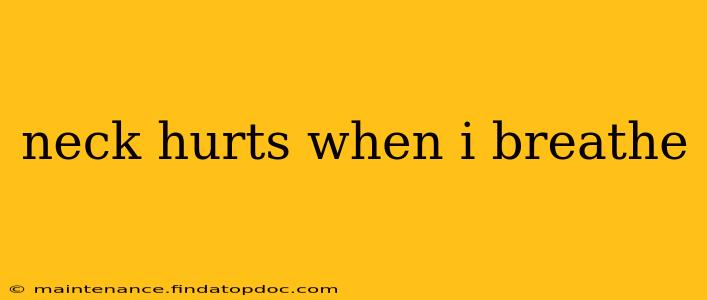Experiencing neck pain that worsens with each breath is alarming and requires attention. This symptom can stem from various sources, ranging from minor muscle strains to more serious underlying conditions. Understanding the potential causes, diagnostic methods, and treatment options is crucial for effective management and relief. This comprehensive guide will explore the various reasons why your neck might hurt when you breathe, helping you navigate your path to recovery.
What Causes Neck Pain When Breathing?
Neck pain aggravated by breathing often points towards issues affecting the structures surrounding your neck and upper chest. Several factors could be at play:
-
Muscle Strain or Sprain: This is a common cause, often resulting from poor posture, sudden movements, or overuse. The muscles in your neck and shoulders work together, and strain in one area can radiate pain to the others, worsening with deep breaths due to increased muscle movement.
-
Cervical Radiculopathy: This condition involves nerve compression in the neck, typically caused by degenerative disc disease, bone spurs, or herniated discs. Breathing can exacerbate pain as it increases movement and pressure on the affected nerves.
-
Temporomandibular Joint (TMJ) Disorder: While primarily affecting the jaw, TMJ disorders can radiate pain to the neck and head. The act of breathing might increase tension in the jaw muscles, leading to increased neck pain.
-
Costochondritis: This involves inflammation of the cartilage that connects your ribs to your breastbone. While primarily chest pain, it can refer pain to the neck, particularly during deep breaths.
-
Respiratory Infections: Conditions like pneumonia or bronchitis can cause intense chest pain, which can often be felt or perceived as radiating neck pain, especially during breathing.
-
Anxiety and Stress: While not a direct physical cause, heightened anxiety can lead to muscle tension in the neck and shoulders, making breathing painful. This is often accompanied by other symptoms like shortness of breath and rapid heart rate.
-
Rare Causes: In rare cases, neck pain worsening with breathing might indicate more serious conditions like tumors, infections of the spine, or other neurological issues. It’s important to consult a medical professional if pain is severe, persistent, or accompanied by other concerning symptoms.
What are the Associated Symptoms?
Understanding accompanying symptoms is crucial for accurate diagnosis. Besides neck pain with breathing, you may experience:
- Headaches: Especially in the back of the head or at the base of the skull.
- Shoulder pain: Pain radiating into the shoulders is common, especially with muscle strains or nerve compression.
- Limited range of motion: Difficulty turning your head or tilting it to the side.
- Numbness or tingling: In the arms, hands, or fingers if a nerve is affected.
- Stiffness: A feeling of tightness and restricted movement in the neck.
- Fever or chills: If a respiratory infection is suspected.
- Difficulty swallowing: In some cases, severe nerve compression can make swallowing difficult.
How is Neck Pain When Breathing Diagnosed?
Diagnosing the cause of your neck pain requires a thorough evaluation by a healthcare professional. This may involve:
- Physical examination: The doctor will assess your range of motion, palpate your neck and shoulders for tenderness, and check your reflexes.
- Medical history review: A detailed discussion about your symptoms, past medical conditions, and any relevant family history.
- Imaging tests: X-rays, CT scans, or MRIs can help visualize the bones, discs, and soft tissues of your neck to identify potential issues like bone spurs, herniated discs, or tumors.
- Nerve conduction studies: These tests may be used to evaluate nerve function if nerve compression is suspected.
How is Neck Pain When Breathing Treated?
Treatment depends on the underlying cause:
-
Muscle strain: Rest, ice, over-the-counter pain relievers (like ibuprofen or acetaminophen), gentle stretching, and physical therapy are often effective.
-
Cervical radiculopathy: Treatment options range from conservative approaches (like medication, physical therapy, and injections) to surgical intervention in severe cases.
-
TMJ disorder: Treatment might involve mouth splints, physical therapy, medications, or even surgery in severe cases.
-
Costochondritis: Rest, ice, and over-the-counter pain relievers are usually sufficient.
-
Respiratory infection: Antibiotics or antiviral medications may be necessary, along with rest and supportive care.
When Should I See a Doctor?
Seek immediate medical attention if your neck pain:
- Is severe or worsening rapidly.
- Is accompanied by fever, chills, or numbness/tingling in your arms or legs.
- Is accompanied by difficulty breathing or swallowing.
- Doesn’t improve after a few days of self-care.
This information is for general knowledge and does not constitute medical advice. Always consult a healthcare professional for diagnosis and treatment of any medical condition.
